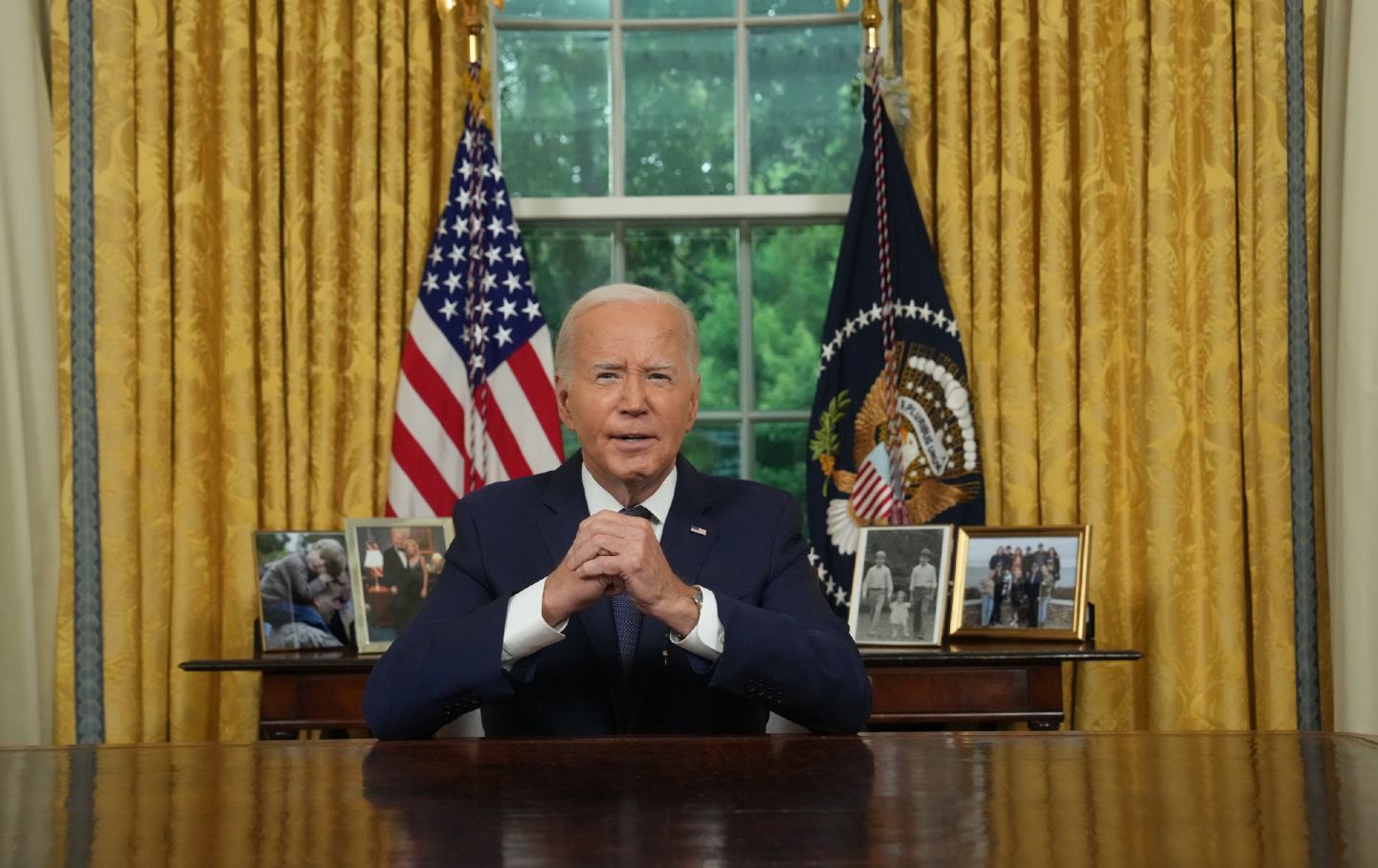
The president deftly avoids the trap of surrendering his critique of MAGA lawlessness.
The attempted assassination of Donald Trump on Saturday has upturned the political world, not least the reelection campaign of Joe Biden. Trump, empowered now with a dramatic photo showing him defiantly raising his fist after being fired on, has assumed the role of a righteous and perhaps divinely protected victim. In response, could Biden really carry on with his planned strategy of highlighting Trump’s threat to American democracy?
Some of Biden’s political allies were so demoralized they seem to have preemptively surrendered. On Sunday, Axios quoted a “senior House Democrat” as saying, “We’ve all resigned ourselves to a second Trump presidency.” Representative Alexandria Ocasio-Cortez correctly responded to this comment by noting, “If you’re a ‘senior Democrat’ that feels this way, you should absolutely retire and make space for true leadership that refuses to resign themselves to fascism. This kind of leadership is functionally useless to the American people. Retire.”
The same tone of resignation was reported by Reuters, which claimed that in the speech Biden was giving on Sunday night, he would emphasize comity and backtrack from anti-Trump polemics. According to Reuters, “Rather than verbally attacking Trump in the coming days, the White House and the Biden campaign will draw on the president’s history of condemning all sorts of political violence including his sharp criticism of the ‘disorder’ created by campus protests over the Israel-Gaza conflict, campaign officials said on condition of anonymity.”
This report produced an immense social media backlash from Democrats upset that, rather than go after Trump, Biden was once again going to trash the largely peaceful pro-Palestinian protest movement, which includes many who normally vote for the Democratic Party.
Perhaps stung by such critiques, the White House quickly disavowed the Reuters report, calling it inaccurate.
When Biden addressed the nation at 8 pm Eastern time, he smartly avoided the trap described by the Reuters report. He condemned political violence and affirmed the importance of settling political disputes in a peaceful way, while also not whitewashing Trump.
Current Issue

In a key passage of the speech, Biden said: “A former president was shot, an American citizen killed, while simply exercising his freedom to support the candidate of his choosing. We cannot, we must not, go down this road in America. We’ve traveled it before throughout our history. Violence has never been the answer, whether it is with members of Congress of both parties being targeted or a violent mob attack in the Capitol on January 6, or the brutal attack of the former speaker of the House Nancy Pelosi or intimidation of election officials, or the kidnapping plot against a sitting governor, or an attempted assassination on Donald Trump.”
Biden’s speech, of course, came in the context of many voters’ questioning whether he is too old to be president. As in many of his recent public utterances, he was halting and at times incoherent even though he was reading from a prepared text. In the passage quoted above, he wrongly referred to an attack on Nancy Pelosi when it was actually an attack on her husband, Paul Pelosi, although the former House speaker was the intended victim. At other points in the very short speech, Biden was flailing and seemed to lose his train of thought.
Despite all these problems of presentation, the thrust of Biden’s speech was deft and nimble. He rightly called for a lowering of the political temperature and increased civility, but he didn’t shy away from reminding his listeners that Republicans such as Trump have dirty hands on this subject. By evoking the aborted coup of January 6, the attack on Paul Pelosi, the intimidation of elected officials, and the attempted kidnapping of Wisconsin Governor Gretchen Whitmer, Biden made clear that he wasn’t going to retreat from criticizing far-right violence of a sort that Trump has often incited or inspired.
Unlike the House Democrat quoted by Axios, Biden is not willing to cede the election. He is old and diminished, but he is not prepared to go gentle into the good night of political defeat.
Whether Biden should remain the Democratic presidential nominee is an open question. There are many younger Democrats, notably Vice President Kamala Harris, who would could carry the same message with more force and clarity.
Be that as it may, Biden deserves credit for laying out how the Democrats can continue to fight the election, making note of the tragic violence of the attempted assassination of Trump but refraining from exonerating Trump’s own sordid history. Biden has cleared a path forward. The whole party should adopt his approach.
Thank you for reading The Nation
We hope you enjoyed the story you just read, just one of the many incisive, deeply-reported articles we publish daily. Now more than ever, we need fearless journalism that shifts the needle on important issues, uncovers malfeasance and corruption, and uplifts voices and perspectives that often go unheard in mainstream media.
Throughout this critical election year and a time of media austerity and renewed campus activism and rising labor organizing, independent journalism that gets to the heart of the matter is more critical than ever before. Donate right now and help us hold the powerful accountable, shine a light on issues that would otherwise be swept under the rug, and build a more just and equitable future.
For nearly 160 years, The Nation has stood for truth, justice, and moral clarity. As a reader-supported publication, we are not beholden to the whims of advertisers or a corporate owner. But it does take financial resources to report on stories that may take weeks or months to properly investigate, thoroughly edit and fact-check articles, and get our stories into the hands of readers.
Donate today and stand with us for a better future. Thank you for being a supporter of independent journalism.